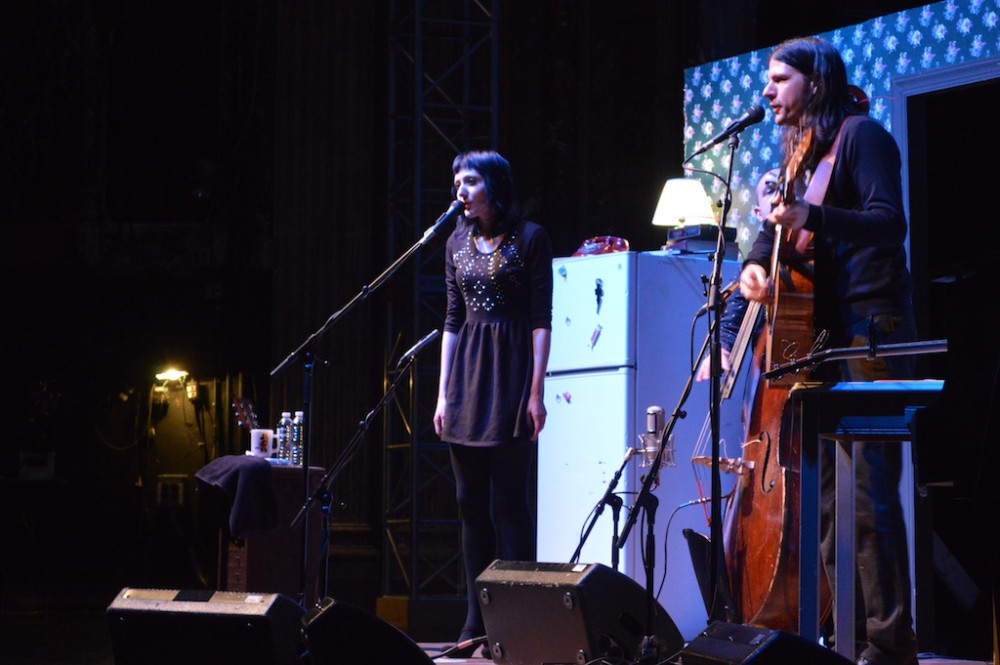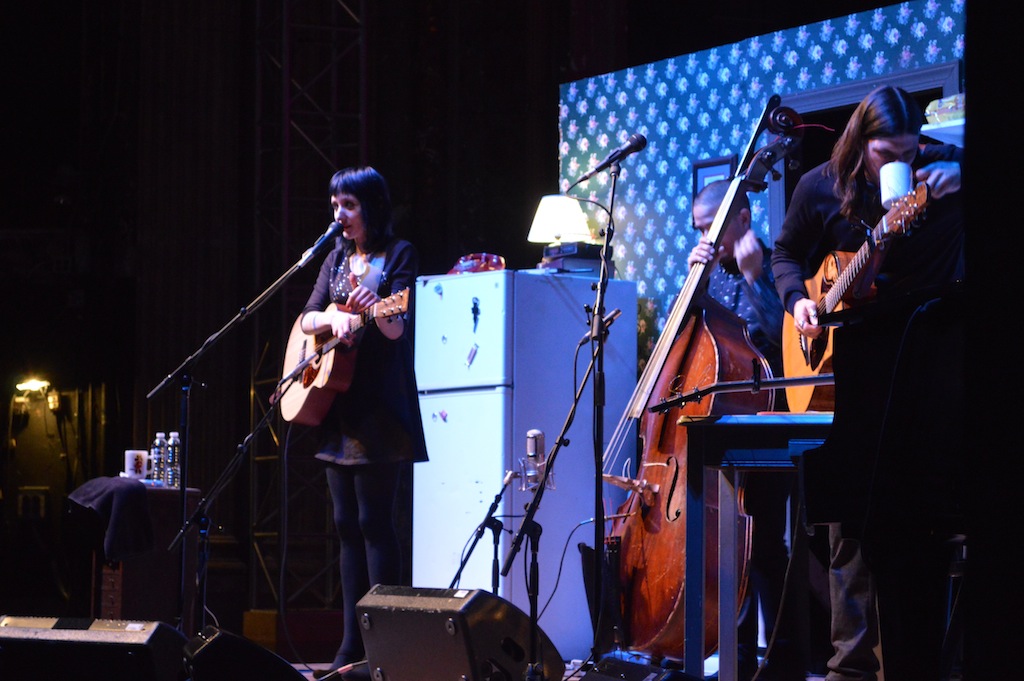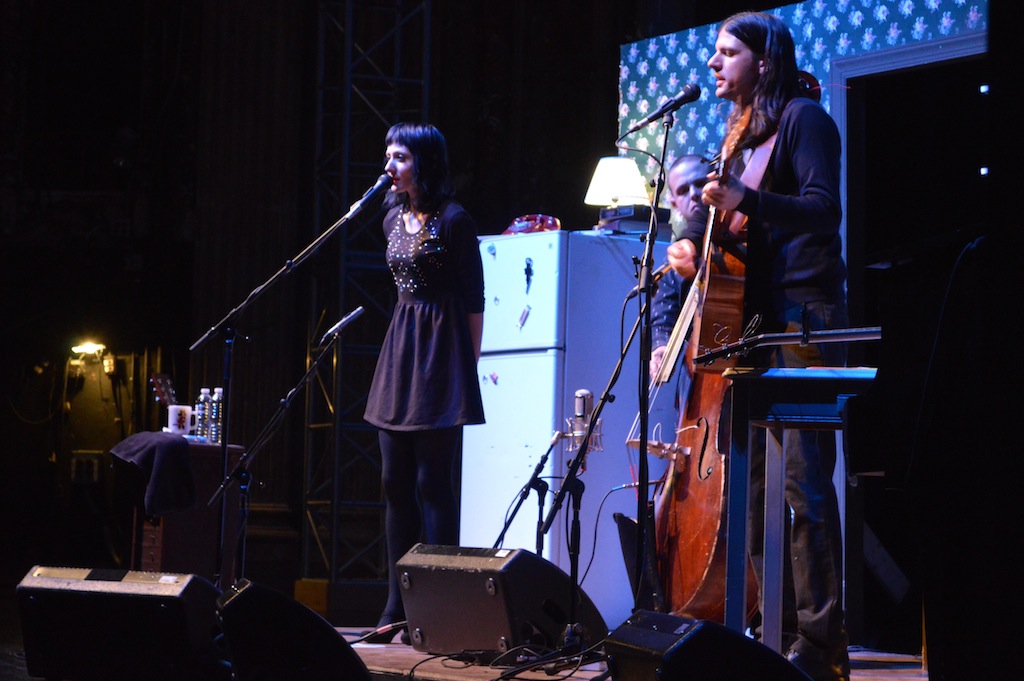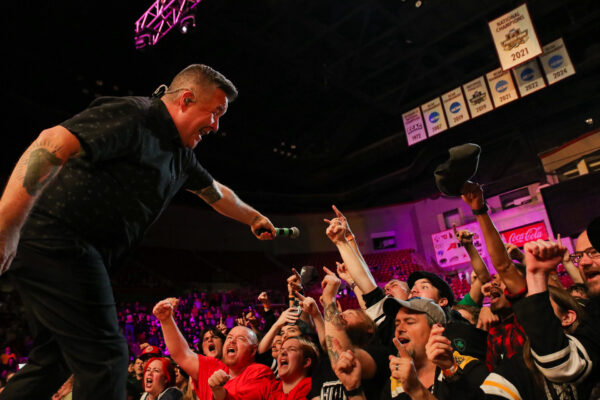There is a closeness shared by families and loved ones that can’t really be replicated with others until you’ve shared the same small spaces with them everyday. It’s a casual intimacy, so routine that it often goes unnoticed. But when you’re on the outside looking in, that same harmony is palpable. And in that sense, it was no surprise to see that last Saturday night (03-14-15) Seth Avett and Jessica Lea Mayfield chose to reject a Pennsylvania theater’s large stage and stick close by each other, often locking eyes while standing inside a small set built to look like a kitchen. Exuding solidarity and charm, the longtime friends and occasional tour mates were appearing at the Keswick Theater in support of their brand new covers record, Seth Avett and Jessica Lea Mayfield Sing Elliott Smith.
The music of Elliot Smith could be ghostly in delivery and haunting in message. In life and in death, he was a mythic figure, injecting bittersweet melodies with a vocal so fragile that it could evaporate into the air at any moment. But despite a paper-thin voice and trembling delivery, Smith’s words and ideas could shatter glass. And though Avett and Mayfield could have emulated the songwriter’s iconic singing and scant production, they wisely chose not to. Crafting a record of interpretation and not impression, they honed in on the ideas and themes that lie at the heart of each song.
Along with bassist Paul Defiglia, they arrived onstage by walking through a door frame carved out of a wall of green floral wallpaper. With framed pictures, a refrigerator and shelves stuffed with bread and cereal behind them, they performed in a make-believe room that wouldn’t ordinarily recall all the big and small conversations that occur across a kitchen table. But when that table was draped by Avett’s guitars, universal discussions between families and friends were tangible. And while it’s place onstage seemed destined to embody the group’s tight-knit family bond, it further mirrored the music’s ability to hit home, puncturing familiar moments with the glaring emotional vulnerability found inside every kitchen on “Memory Lane.”
Eliciting an easy camaraderie and relaxed stage presence, Avett and Mayfield took turns singing lead throughout the night. Sipping coffee and sharing stories, they peppered their set with some of their favorite Smith songs that didn’t make the album, as well as other artist’s songs that Avett said represented a “common ground,” and a “shared influence and inspiration” between he, Mayfield and Smith. Early on, the inclusion of Bob Dylan’s “Just Like A Woman,” depicted just one of those shared influences. Singing over a warm melody, Avett played with his eyes closed as his brow rose and fell with the chord progression. As Avett and Mayfield sang, each of their voices seemed to wrap around the other, blending perfectly as they rolled out of the speakers and settled in the air.
After Avett introduced “The Ballad of Big Nothing,” as one of the record’s “flagship songs,” Mayfield took the lead, gently swaying and occasionally smiling with the landing of each lyrical punch. Understated and beautiful, Mayfield’s voice seemed to weave around each note, guiding the melody as much as the instruments. There is a muted quality to all of Smith’s songs, although when paired with Avett’s acoustic and Defiglia’s bass, Mayfield’s strong vocals uncovered a galvanizing strength. Bobbing up and down like a buoy, Avett strummed his guitar and smiled so broadly as he sang back up that one couldn’t help but wonder if he was supposed to come in, or just couldn’t help it.
“Memory Lane,” was perhaps the most changed of all the compositions Avett and Mayfield performed. Powerfully moving, the melody was slowed down and fleshed out considerably. And while Smith’s songwriting was often described as ‘Beatle-esque,’ it is Avett and Mayfield’s version that could be a long lost Lennon outtake. Pairing pretty harmonies with stark descriptions of ache and distress, Avett’s lead vocal captured the emotional vacancy, indignity and resignation of “being dragged against your will from the basement on the hill.”
“There was a moment when this project really started, and I believe that moment was the first time I heard Jessica sing this one. And it sparked something in my mind and in my heart and it’s what I always went back to draw from, to keep pushing through to finish the record.”
Seated at a piano on the far right of the stage, Avett revealed how hearing Mayfield sing “Twilight,” is what had initially inspired their collaboration. And while she does sing lead on their version of the song, their shared vocal lines are more affecting here than on any other composition. Complimenting each other beautifully, the combination of their voices provided a radiance that was piercing. When they sang, “You’re wonderful, it’s beautiful, but I’m already somebody’s baby,” it was with guilt and sadness so cutting that you could practically feel the walls closing in. But despite the wounding claustrophobia and emotional entanglements portrayed throughout the Smith songbook, there remains something about it that feels sweeping, limitless and beautiful. And while it’s hard to pinpoint, Seth Avett and Jessica Lea Mayfield have captured that same element, nourishing this collection of songs with a boundless soul and grace.
Article by: Caitlin Phillips











